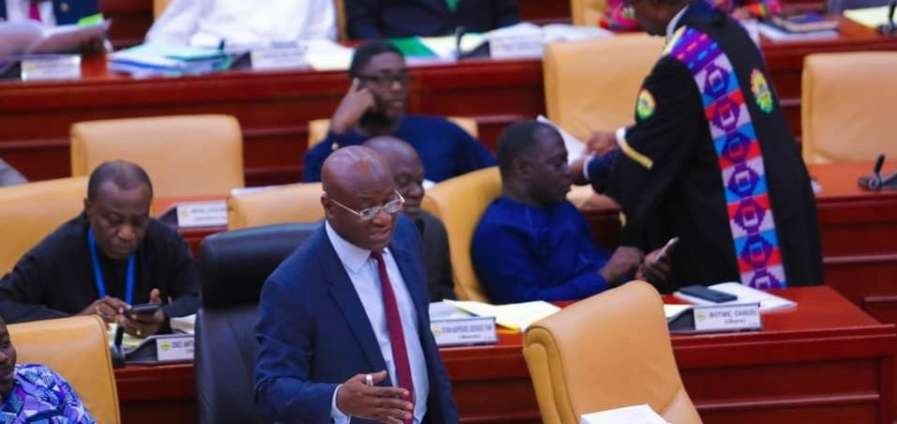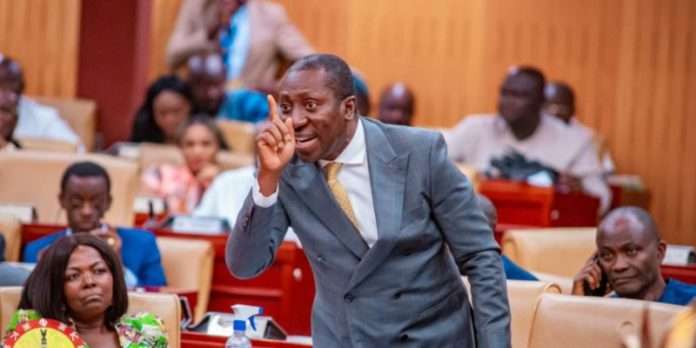In what many have described as a stunning turn of events, the Majority Leader, Honorable Osei Kyei-Mensah-Bonsu has chosen to step down from his role as the leader of the Majority Caucus in Parliament.
The announcement according to reports was made during a crucial meeting at the Jubilee House’s banquet hall in Accra, which was attended by members of the Majority Caucus at the behest of President Nana Addo Dankwa Akufo-Addo.
The decision, described as voluntary, comes amidst escalating tensions within the ruling New Patriotic Party parliamentary group, fueled by reports of plans to replace the Suame lawmaker, Honorable Osei Kyei-Mensah-Bonsu with Effutu legislator, Alexander Afenyo-Markin.
The Suame Member of Parliament’s decision to resign voluntarily appears to be a strategic effort to quell internal discord and pave the way for formalizing leadership changes within the party.

Meanwhile, reports indicate that the Effutu Member of Parliament and Deputy Majority Leader would replace the Suame lawmaker as the new Majority Leader following the latter’s voluntary resignation.
This potential shift not only signifies a changing of the guard but holds broader implications for regional balance in political leadership, particularly in Parliament for the two main political parties in the country.
An intriguing aspect of the development is the significance attached to the Central Region. For instance if the Effutu lawmaker assumes the role of Majority Leader, it would result in both leaders from the Majority and Minority Caucuses hailing from the Central Region.
The move would also underscore the New Patriotic Party’s recognition of the pivotal role the Central Region plays in Ghana’s electoral politics.
It is important to state that historical data reveals a compelling trend where any political party that wins the Central Region in the country’s general elections often correlates with success in presidential elections.
For instance, the region played a significant role in the victory of the late Jerry John Rawlings, the National Democratic Congress (NDC) candidate, in the inaugural 1992 elections as well as his re-election in 1996 while in the 2000 elections, the Central Region showed a shift in favour of John Agyekum Kufuor of the New Patriotic Party (NPP) who won the Presidency.
The region continued to lean towards the New Patriotic Party, contributing to Former President Kufuor’s re-election in 2004, while the 2008 elections saw a return of the National Democratic to power with John Atta Mills as the President with the Central Region contributing significantly to the party’s victory.
The region again remained a competitive battleground in 2012, but the National Democratic Congress under Former President John Mahama, maintained considerable support in the region and won the election.
Moreover, in 2016, President Nana Addo Dankwa Akufo-Addo of the New Patriotic Party won the Presidency with the Central Region playing a pivotal role in the party’s victory while the region continued to give the party significant support in their re-election bid in the 2020 general election.
From the above, it is therefore not out of place for a political party that seeks to win an election to show concern about how it could maximize its gains in such a region to win a major election in the country.
Lawyer Kofi Bentil, a senior Vice President for IMANI Centre for Policy and Education, highlighted the significance of the Central Region in Ghana’s electoral politics and indicated that the region over the years played a crucial role in the electoral fortunes of any political party that wins the election.
According to him, the New Patriotic Party selecting a leader in Parliament from such a strategic region, and with no other Member of Parliament but the Honorable Alexander Kwamena Afenyo Markin would enhance the party’s chances in the upcoming December 7 general election.
“There is no better person to lead in Parliament than Alex Markin. Apart from his demonstrated competence and loyalty, he is from the strategic Central Region! It’s near impossible to lose CR and win the election!!”
Lawyer Kofi Bentil

It is therefore without doubt that the decision to place the Effutu Member of Parliament, Honorable Alexander Kwamena Afenyo-Markin at the forefront of the Majority Caucus in Parliament positions the Central Region as the battleground for the upcoming 2024 general elections.
This move also acknowledges the region’s influence and cements its status as a key player in shaping the country’s electoral politics.
So while the Suame lawmaker, Honorable Osei Kyei-Mensah-Bonsu’s voluntary resignation marks a pivotal moment in Ghanaian parliamentary politics, the decision to replace him with the Effutu Member of Parliament underlines the intricate interplay between regional dynamics and the country’s national politics, particularly as the country navigates the path towards the 2024 general elections.
READ ALSO: IMANI’s Kofi Bentil Backs Afenyo Markin As Majority Leader, Calls For Smooth Transition



















